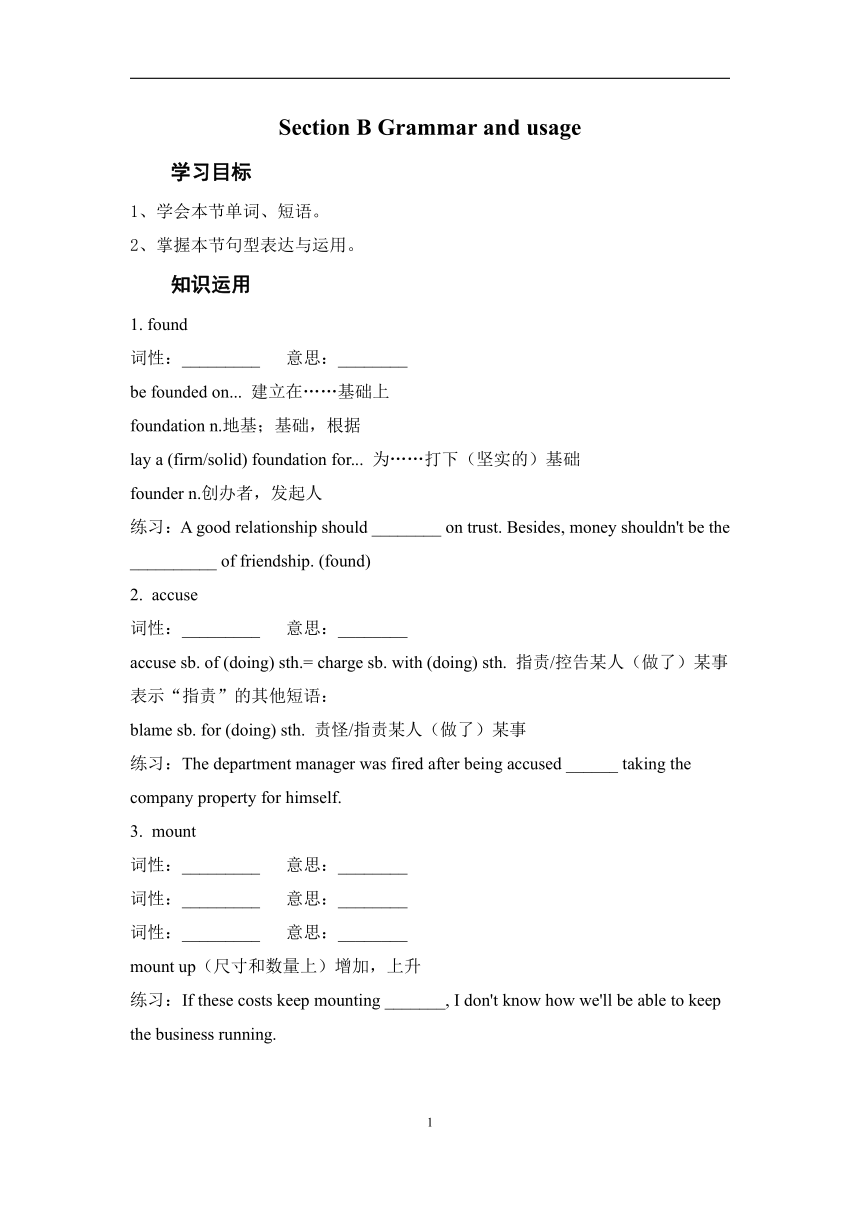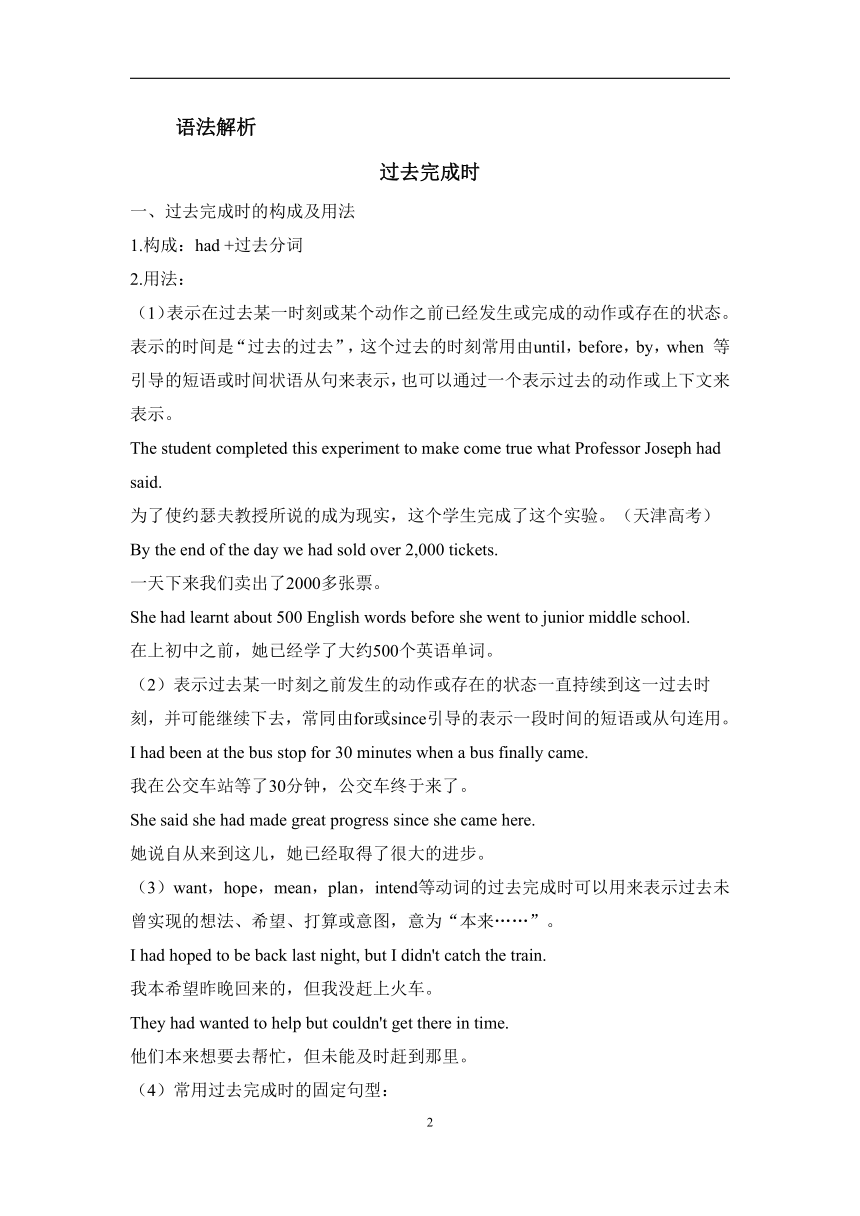牛津译林版(2019)选择性必修第二册Unit 1 The mass media Section B Grammar and usage学案(有答案)
文档属性
| 名称 | 牛津译林版(2019)选择性必修第二册Unit 1 The mass media Section B Grammar and usage学案(有答案) |  | |
| 格式 | doc | ||
| 文件大小 | 102.5KB | ||
| 资源类型 | 教案 | ||
| 版本资源 | 牛津译林版(2019) | ||
| 科目 | 英语 | ||
| 更新时间 | 2022-11-15 17:07:13 | ||
图片预览


文档简介
Section B Grammar and usage
学习目标
1、学会本节单词、短语。
2、掌握本节句型表达与运用。
知识运用
1. found
词性:_________ 意思:________
be founded on... 建立在……基础上
foundation n.地基;基础,根据
lay a (firm/solid) foundation for... 为……打下(坚实的)基础
founder n.创办者,发起人
练习:A good relationship should ________ on trust. Besides, money shouldn't be the __________ of friendship. (found)
2. accuse
词性:_________ 意思:________
accuse sb. of (doing) sth.= charge sb. with (doing) sth. 指责/控告某人(做了)某事
表示“指责”的其他短语:
blame sb. for (doing) sth. 责怪/指责某人(做了)某事
练习:The department manager was fired after being accused ______ taking the company property for himself.
3. mount
词性:_________ 意思:________
词性:_________ 意思:________
词性:_________ 意思:________
mount up(尺寸和数量上)增加,上升
练习:If these costs keep mounting _______, I don't know how we'll be able to keep the business running.
语法解析
过去完成时
一、过去完成时的构成及用法
1.构成:had +过去分词
2.用法:
(1)表示在过去某一时刻或某个动作之前已经发生或完成的动作或存在的状态。表示的时间是“过去的过去”,这个过去的时刻常用由until,before,by,when 等引导的短语或时间状语从句来表示,也可以通过一个表示过去的动作或上下文来表示。
The student completed this experiment to make come true what Professor Joseph had said.
为了使约瑟夫教授所说的成为现实,这个学生完成了这个实验。(天津高考)By the end of the day we had sold over 2,000 tickets.
一天下来我们卖出了2000多张票。
She had learnt about 500 English words before she went to junior middle school.
在上初中之前,她已经学了大约500个英语单词。
(2)表示过去某一时刻之前发生的动作或存在的状态一直持续到这一过去时刻,并可能继续下去,常同由for或since引导的表示一段时间的短语或从句连用。
I had been at the bus stop for 30 minutes when a bus finally came.
我在公交车站等了30分钟,公交车终于来了。
She said she had made great progress since she came here.
她说自从来到这儿,她已经取得了很大的进步。
(3)want,hope,mean,plan,intend等动词的过去完成时可以用来表示过去未曾实现的想法、希望、打算或意图,意为“本来……”。
I had hoped to be back last night, but I didn't catch the train.
我本希望昨晚回来的,但我没赶上火车。
They had wanted to help but couldn't get there in time.
他们本来想要去帮忙,但未能及时赶到那里。
(4)常用过去完成时的固定句型:
①在"hardly ... when.."或"no sooner ... than...”句型中,主句用过去完成时,从句用一般过去时。
I had no sooner arrived home than it began to rain. (= No sooner had I arrived home than it began to rain.)
我刚到家就开始下雨了。
注意:
hardly或 no sooner位于句首时,句子要用部分倒装语序。
Hardly had we sat down when the phone rang. =We had hardly sat down when the phone rang.
我们刚坐下电话就响了。
②在"It was the first/second/... time (that)..."句型中,从句用过去完成时。
It was the first time (that) I had chatted online in English.
那是我第一次用英语在网上聊天。
二、过去完成时与一般过去时的用法比较
虽然这两种时态都表示过去发生的动作或存在的状态,但在使用时应注意以下几点:
1.时间状语不同:过去完成时在时间上强调“过去的过去”,而一般过去时强调过去某一特定的时间。试比较:
They had arrived at the station by ten o'clock yesterday.
他们昨天十点之前就已经到达车站了。
They arrived at the station at ten o'clock yesterday.
他们昨天十点到达了车站。
2.在没有明确的时间状语时,先发生的动作用过去完成时,后发生的动作则用一般过去时。
Instead of getting down to a new task as I had expected, he examined the previous work again.
他没有像我所期望的那样着手做新工作,而是又检查了一遍以前的工作。
注意:
如果before引导的时间状语从句用一般过去时,主句可用一般过去时代替过去完成时。after引导的时间状语从句可用一般过去时代替过去完成时。
John (had) left before I came home.
我回家之前约翰就离开了。
Jane went out to the park after she (had) read the paper.
简读完报纸就外出去公园了。
练习:
1. One morning she told her children about a family she _________ (visit) the day before.
2. By the end of 2020, Pruitt ________ (repair) more than 140 for donation or to be returned to their owners.
3. When walking down the street, I came across David, whom I _______ for years.
A. didn't see B. haven't seen C. hadn't seen D. wouldn't see
4. I _______ (hope) to send Peter a gift to congratulate him on his marriage, but I couldn't manage it.
5. The twins, who ________ (finish) their homework, were allowed to play badminton on the playground.
答案
知识运用
1. be founded; foundation 2. of 3. up
语法解析
1.had visited
2. had repaired
3. C
4. had hoped
5. had finished
2
学习目标
1、学会本节单词、短语。
2、掌握本节句型表达与运用。
知识运用
1. found
词性:_________ 意思:________
be founded on... 建立在……基础上
foundation n.地基;基础,根据
lay a (firm/solid) foundation for... 为……打下(坚实的)基础
founder n.创办者,发起人
练习:A good relationship should ________ on trust. Besides, money shouldn't be the __________ of friendship. (found)
2. accuse
词性:_________ 意思:________
accuse sb. of (doing) sth.= charge sb. with (doing) sth. 指责/控告某人(做了)某事
表示“指责”的其他短语:
blame sb. for (doing) sth. 责怪/指责某人(做了)某事
练习:The department manager was fired after being accused ______ taking the company property for himself.
3. mount
词性:_________ 意思:________
词性:_________ 意思:________
词性:_________ 意思:________
mount up(尺寸和数量上)增加,上升
练习:If these costs keep mounting _______, I don't know how we'll be able to keep the business running.
语法解析
过去完成时
一、过去完成时的构成及用法
1.构成:had +过去分词
2.用法:
(1)表示在过去某一时刻或某个动作之前已经发生或完成的动作或存在的状态。表示的时间是“过去的过去”,这个过去的时刻常用由until,before,by,when 等引导的短语或时间状语从句来表示,也可以通过一个表示过去的动作或上下文来表示。
The student completed this experiment to make come true what Professor Joseph had said.
为了使约瑟夫教授所说的成为现实,这个学生完成了这个实验。(天津高考)By the end of the day we had sold over 2,000 tickets.
一天下来我们卖出了2000多张票。
She had learnt about 500 English words before she went to junior middle school.
在上初中之前,她已经学了大约500个英语单词。
(2)表示过去某一时刻之前发生的动作或存在的状态一直持续到这一过去时刻,并可能继续下去,常同由for或since引导的表示一段时间的短语或从句连用。
I had been at the bus stop for 30 minutes when a bus finally came.
我在公交车站等了30分钟,公交车终于来了。
She said she had made great progress since she came here.
她说自从来到这儿,她已经取得了很大的进步。
(3)want,hope,mean,plan,intend等动词的过去完成时可以用来表示过去未曾实现的想法、希望、打算或意图,意为“本来……”。
I had hoped to be back last night, but I didn't catch the train.
我本希望昨晚回来的,但我没赶上火车。
They had wanted to help but couldn't get there in time.
他们本来想要去帮忙,但未能及时赶到那里。
(4)常用过去完成时的固定句型:
①在"hardly ... when.."或"no sooner ... than...”句型中,主句用过去完成时,从句用一般过去时。
I had no sooner arrived home than it began to rain. (= No sooner had I arrived home than it began to rain.)
我刚到家就开始下雨了。
注意:
hardly或 no sooner位于句首时,句子要用部分倒装语序。
Hardly had we sat down when the phone rang. =We had hardly sat down when the phone rang.
我们刚坐下电话就响了。
②在"It was the first/second/... time (that)..."句型中,从句用过去完成时。
It was the first time (that) I had chatted online in English.
那是我第一次用英语在网上聊天。
二、过去完成时与一般过去时的用法比较
虽然这两种时态都表示过去发生的动作或存在的状态,但在使用时应注意以下几点:
1.时间状语不同:过去完成时在时间上强调“过去的过去”,而一般过去时强调过去某一特定的时间。试比较:
They had arrived at the station by ten o'clock yesterday.
他们昨天十点之前就已经到达车站了。
They arrived at the station at ten o'clock yesterday.
他们昨天十点到达了车站。
2.在没有明确的时间状语时,先发生的动作用过去完成时,后发生的动作则用一般过去时。
Instead of getting down to a new task as I had expected, he examined the previous work again.
他没有像我所期望的那样着手做新工作,而是又检查了一遍以前的工作。
注意:
如果before引导的时间状语从句用一般过去时,主句可用一般过去时代替过去完成时。after引导的时间状语从句可用一般过去时代替过去完成时。
John (had) left before I came home.
我回家之前约翰就离开了。
Jane went out to the park after she (had) read the paper.
简读完报纸就外出去公园了。
练习:
1. One morning she told her children about a family she _________ (visit) the day before.
2. By the end of 2020, Pruitt ________ (repair) more than 140 for donation or to be returned to their owners.
3. When walking down the street, I came across David, whom I _______ for years.
A. didn't see B. haven't seen C. hadn't seen D. wouldn't see
4. I _______ (hope) to send Peter a gift to congratulate him on his marriage, but I couldn't manage it.
5. The twins, who ________ (finish) their homework, were allowed to play badminton on the playground.
答案
知识运用
1. be founded; foundation 2. of 3. up
语法解析
1.had visited
2. had repaired
3. C
4. had hoped
5. had finished
2
同课章节目录
